gypsies
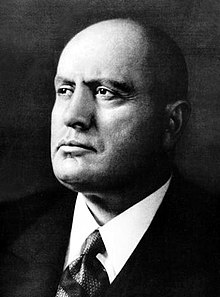 Every United States Presidential election brings heated debates, and many arguments from both sides of the aisle. I’m sure it is the same in most other nations, who have the opportunity to vote too. Being an unapologetic Conservative, it is my belief that the less the government controls the citizens the better. Socialism and Fascism are both forms of government control, and while some people think these are great, they ultimately find out that what the government gives, the government can also take away. This was what we saw with Adolf Hitler. He came into office as an elected official, and before long, he changed everything for the German people, and in many ways the world, especially the Jewish people, Gypsies, and any other groups he disagreed with. The people were fooled into thinking he was a great man, until it was too late.
Every United States Presidential election brings heated debates, and many arguments from both sides of the aisle. I’m sure it is the same in most other nations, who have the opportunity to vote too. Being an unapologetic Conservative, it is my belief that the less the government controls the citizens the better. Socialism and Fascism are both forms of government control, and while some people think these are great, they ultimately find out that what the government gives, the government can also take away. This was what we saw with Adolf Hitler. He came into office as an elected official, and before long, he changed everything for the German people, and in many ways the world, especially the Jewish people, Gypsies, and any other groups he disagreed with. The people were fooled into thinking he was a great man, until it was too late.
Similar to Adolf Hitler, Italian Fascist leader Benito Mussolini did not become the dictator of a totalitarian regime overnight. Mussolini started out as a schoolteacher and an avowed socialist. After World War I he became a leader of the nascent Fascist movement. Like much of Europe, Italy was in the middle of great social turmoil following World War I. During the turmoil, paramilitary groups and street gangs frequently clashed over their competing ideas for the new political order. A close confidant of Mussolini formed a Fascist paramilitary group, known as the Blackshirts or Squadristi, and because Mussolini was their leader, the gangs found that government fears of a communist revolution allowed them to operate without state intervention. Apparently, the people thought Socialism and Fascism were better than Communism. By 1921, Mussolini had been elected to parliament as the leader of the growing National Fascist Party.
Soon after Mussolini’s election…the party’s Chosen One…armed Blackshirts marched on Rome, demanding that the king install Mussolini as Prime Minister. Why the king allowed this to happen, is beyond me, but in a decision that utterly changed the course of Italian and European history, King Victor Emmanuel III ignored Prime Minister Luigi Facta’s pleas that he declare martial law, leading to Facta’s resignation and Emmanuel’s invitation to Mussolini to form a new government. It was a move that was completely insane. The Fascists and their moderate allies began dismantling Italy’s democratic institutions. Mussolini was proclaimed dictator for a year, like that was going to be all it was, and increasingly merged his party and its paramilitary wing with the state and the official military. He also undertook a program of privatizations and anti-union legislation in order to assure industrialists and aristocrats that fascism would protect them from socialism. Before long, the Italian government didn’t even resemble its former self.
Still, many Fascists felt Mussolini was moving too slowly, so they took matters into their own hands. In 1924, assassins with ties to Mussolini killed socialist leader Giacomo Matteotti, leading most of the parliamentary opposition to boycott Mussolini’s legislature. The Fascists felt that their moment had come. On December 31, 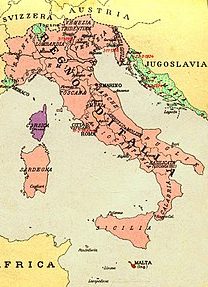 they issued an ultimatum to Mussolini. Three days later on January 3rd, he addressed the remainder of parliament, declaring “I, and I alone, assume the political, moral, and historical responsibility for all that has happened,” obliquely referring to the assassination of Matteotti. In doing this, Mussolini dared prosecutors and the rest of Italy’s democratic institutions, as well as the king, to challenge his authority. It was their last chance, but no one opposed him. Thus, from 1925 onward, Mussolini was able to operate openly as a dictator, styling himself Il Duce (meaning The Leader) and fusing the state and the Fascist Party. For the next two decades, suppression and brutality became the norm, culminating in Mussolini’s alliance with Nazi Germany and World War II. I heard it said that, “You can vote yourself into Socialism, but you will have to shoot your way out of it.” It is a good warning for all of us as we approach the next Presidential election. We have a number of candidates who want Socialism, and it would be a dire mistake to allow that to happen to our free, Capitalist nation. People don’t always understand how important our elections are.
they issued an ultimatum to Mussolini. Three days later on January 3rd, he addressed the remainder of parliament, declaring “I, and I alone, assume the political, moral, and historical responsibility for all that has happened,” obliquely referring to the assassination of Matteotti. In doing this, Mussolini dared prosecutors and the rest of Italy’s democratic institutions, as well as the king, to challenge his authority. It was their last chance, but no one opposed him. Thus, from 1925 onward, Mussolini was able to operate openly as a dictator, styling himself Il Duce (meaning The Leader) and fusing the state and the Fascist Party. For the next two decades, suppression and brutality became the norm, culminating in Mussolini’s alliance with Nazi Germany and World War II. I heard it said that, “You can vote yourself into Socialism, but you will have to shoot your way out of it.” It is a good warning for all of us as we approach the next Presidential election. We have a number of candidates who want Socialism, and it would be a dire mistake to allow that to happen to our free, Capitalist nation. People don’t always understand how important our elections are.
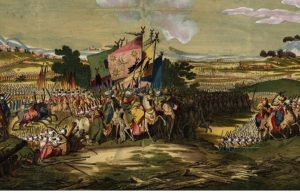 We have all made mistakes, but thankfully, most of them don’t end up costing people their lives. Nevertheless, there are few mistakes that can measure up to the Battle of Karansebes. In 1788, Austria was at war with Turkey, fighting over control of the Danube River. About 100,000 Austrian troops were camped near Karansebes, which is a village that is located in what is today Romania. Scouts were sent ahead to see if they could locate any Turkish soldiers. The scouts didn’t find any evidence of Turks, but they found gypsies…who as it turns out, had a lot of alcohol to sell, and the scouts bought it.
We have all made mistakes, but thankfully, most of them don’t end up costing people their lives. Nevertheless, there are few mistakes that can measure up to the Battle of Karansebes. In 1788, Austria was at war with Turkey, fighting over control of the Danube River. About 100,000 Austrian troops were camped near Karansebes, which is a village that is located in what is today Romania. Scouts were sent ahead to see if they could locate any Turkish soldiers. The scouts didn’t find any evidence of Turks, but they found gypsies…who as it turns out, had a lot of alcohol to sell, and the scouts bought it.
After returning to camp, with the alcohol, they started drinking, thinking that the next day they would be going into battle, so why not enjoy the evening before with a party, since the best thing to do the night before a big battle is get very, very drunk. As happens with a drunken party, the revelers got very loud and quite obnoxious. The noise attracted the attention of several foot soldiers who wanted to join in. The scouts were not interested in sharing the alcohol, and being very drunk, they weren’t careful in how that told the foot soldiers that they were not welcome.
Once the argument began, it quickly escalated into a fight. The alcohol was confiscated, more men joined in the fight, punches were thrown, and a shot rang out. In the middle of the chaos, someone shouted that the Turks had arrived. Most of the soldiers fled the scene immediately, because they were unprepared for battle. Others got into formation and charged at the supposed enemy. Shots were fired, cavalry was assembled, and the defecting soldiers were killing every man they saw without thinking. Needless to say, the Turkish army had not arrived. They wandered into Karansebes two days later and found 10,000 dead or wounded Austrian soldiers. A little confused by this turn of events, they were nonetheless delighted to take Karansebes without any effort.
If you ever feel like you’ve “made a huge mistake,” just remember…it’s probably not bigger than the Battle of Karansebes. When an army mistakes its own soldiers for the enemy, and mistakenly fights and kills 10,000 men…well, that is a huge mistake!! Some people say that the Battle of Karansebes never happened, because 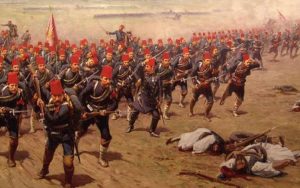 they can’t find any conclusive evidence to show that it happened. Seriously, if I were in charge of the Austrian Army, I might not want anyone to know of this mistake either. Still, those who believe in the battle said that the army could very easily have gotten confused. At the time, the Austrian army was made up of people who spoke German, Hungarian, Polish, and Czechoslovakian, among other languages. This resulted in a lot of confusion and miscommunication as many troops and officers weren’t able to understand each other. I can certainly see where that could bring the kind of confusion that could have cause the army to fight themselves, especially in a drunken state.
they can’t find any conclusive evidence to show that it happened. Seriously, if I were in charge of the Austrian Army, I might not want anyone to know of this mistake either. Still, those who believe in the battle said that the army could very easily have gotten confused. At the time, the Austrian army was made up of people who spoke German, Hungarian, Polish, and Czechoslovakian, among other languages. This resulted in a lot of confusion and miscommunication as many troops and officers weren’t able to understand each other. I can certainly see where that could bring the kind of confusion that could have cause the army to fight themselves, especially in a drunken state.
 Sometimes, there are events in history that end up tied to other events in history, in one way or another. On this day, December 9, 2003, Tehran, Iran was hit by unseasonably cold temperature, that led to the deaths of 40 people from hypothermia. It is very rare to see such large groups of people die in this way at the same time, but it does happen, as seen in Tehran. Their deaths occurred when their core body temperature fell to 77 degrees Fahrenheit. So, how does this have anything to do with history beyond 2003? Well, it actually does, and not in a good way.
Sometimes, there are events in history that end up tied to other events in history, in one way or another. On this day, December 9, 2003, Tehran, Iran was hit by unseasonably cold temperature, that led to the deaths of 40 people from hypothermia. It is very rare to see such large groups of people die in this way at the same time, but it does happen, as seen in Tehran. Their deaths occurred when their core body temperature fell to 77 degrees Fahrenheit. So, how does this have anything to do with history beyond 2003? Well, it actually does, and not in a good way.
Most of us, these days, know about hypothermia. In fact, the causes and the fixes are pretty well known, but what I didn’t know before, although maybe I should have, is that the information we have on hypothermia came from the horrible experiments that the Nazis performed on the prisoners at the Dachau concentration camp during World War II. These unethical medical experiments that were carried out during the Third Reich fell into three categories. The first category consists of experiments aimed at facilitating the survival of Axis military personnel. In Dachau, physicians from the German air force and from the German Experimental Institution for Aviation conducted high-altitude experiments, using a low-pressure chamber, to determine the maximum altitude from which crews of damaged aircraft could parachute to safety. Scientists there carried out so-called freezing experiments using prisoners to find an effective treatment for hypothermia. While the findings might have been a good thing, the way the experiments were carried out was horrendous. After these experiments, most people knew that if they were 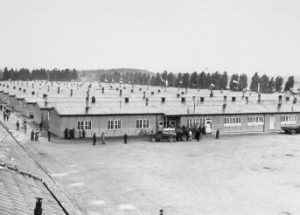 outside in frigid temperatures, they could die of hypothermia. Nevertheless, there were a few miracle situations, such as the two year old girl in Canada in 1994, who survived after her core body temperature dropped to 57 degrees Fahrenheit when she wandered away from her home in Saskatchewan.
outside in frigid temperatures, they could die of hypothermia. Nevertheless, there were a few miracle situations, such as the two year old girl in Canada in 1994, who survived after her core body temperature dropped to 57 degrees Fahrenheit when she wandered away from her home in Saskatchewan.
The second category of experimentation involved developing and testing pharmaceuticals and treatment methods for injuries and illnesses which German military and occupation personnel encountered in the field. Apparently the Nazis felt free to find ways to save their soldiers lives, at the expense of their prisoners. At the German concentration camps of Sachsenhausen, Dachau, Natzweiler, Buchenwald, and Neuengamme, prisoners were subjected to immunization compounds for the prevention and treatment of contagious diseases, including malaria, typhus, tuberculosis, typhoid fever, yellow fever, and infectious hepatitis. The Ravensbrueck camp was the site of bone-grafting experiments and experiments to test the efficacy of newly developed sulfanilamide drugs. At Natzweiler and Sachsenhausen, scientists tested prisoners with phosgene and mustard gas in order to find possible antidotes. Their lives simply didn’t matter when it came to the experimentation.
The third category of medical experimentation sought to advance the racial and ideological principles of the Nazi worldview. The most infamous were the experiments of Josef Mengele at Auschwitz. Mengele conducted medical experiments on twins. He also directed serological experiments on Roma Gypsies, as did Werner 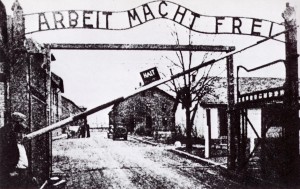 Fischer at Sachsenhausen, in order to determine how different “races” withstood various contagious diseases. The research of August Hirt at Strasbourg University also intended to establish “Jewish racial inferiority.” Other gruesome experiments meant to further Nazi racial goals were a series of sterilization experiments, undertaken primarily at Auschwitz and Ravensbrueck. There, scientists tested a number of methods in their effort to develop an efficient and inexpensive procedure for the mass sterilization of Jews, Roma Gypsies, and other groups that the Nazi leaders considered to be racially or genetically undesirable. It is difficult for me to even think about the cruelty that the Nazis inflicted on the Jews and Gypsies during those horrible years.
Fischer at Sachsenhausen, in order to determine how different “races” withstood various contagious diseases. The research of August Hirt at Strasbourg University also intended to establish “Jewish racial inferiority.” Other gruesome experiments meant to further Nazi racial goals were a series of sterilization experiments, undertaken primarily at Auschwitz and Ravensbrueck. There, scientists tested a number of methods in their effort to develop an efficient and inexpensive procedure for the mass sterilization of Jews, Roma Gypsies, and other groups that the Nazi leaders considered to be racially or genetically undesirable. It is difficult for me to even think about the cruelty that the Nazis inflicted on the Jews and Gypsies during those horrible years.

 I have always been somewhat amazed that, after a war is over, it seems that there must follow a trial for war crimes. It isn’t so much the trial, the obvious crimes against humanity that are always a part of war, or even the outrage over it all, that most amazes me, but rather the fact that even in war, people are expected to follow certain standards, or rules of engagement. I think that there are evil people on either side of a war, but some wars seem to have more evil involved than others…or maybe we were just more appalled in earlier wars. I think that is a possibility, because we have all become less shocked by the heinous acts people are able to perform. Still, I am completely shocked that they can stomach such things without becoming violently ill.
I have always been somewhat amazed that, after a war is over, it seems that there must follow a trial for war crimes. It isn’t so much the trial, the obvious crimes against humanity that are always a part of war, or even the outrage over it all, that most amazes me, but rather the fact that even in war, people are expected to follow certain standards, or rules of engagement. I think that there are evil people on either side of a war, but some wars seem to have more evil involved than others…or maybe we were just more appalled in earlier wars. I think that is a possibility, because we have all become less shocked by the heinous acts people are able to perform. Still, I am completely shocked that they can stomach such things without becoming violently ill.
The horrible crimes committed against the Jews and the Gypsies prior to and during World War II, were crimes 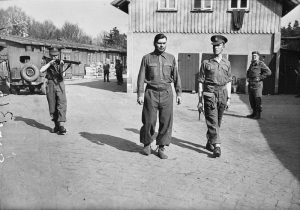 that the Allies simply could not overlook. The Belsen trial was one of several trials the Allied occupation forces held against former officials of Nazi Germany after the end of the war. The Belsen trial took place in Lüneburg, Lower Saxony, Germany in 1945. The defendants were men and women of the SS as well as prisoner officials who had worked at various concentration camps, notably Auschwitz and Bergen-Belsen. People around the world were interested in these trials, and as the public heard for the first time from some of those responsible for the mass murder in the eastern extermination camps, they were filled with contempt. Some later trials are also referred to as Belsen trials, a name that became synonymous with war crime trails of World War II.
that the Allies simply could not overlook. The Belsen trial was one of several trials the Allied occupation forces held against former officials of Nazi Germany after the end of the war. The Belsen trial took place in Lüneburg, Lower Saxony, Germany in 1945. The defendants were men and women of the SS as well as prisoner officials who had worked at various concentration camps, notably Auschwitz and Bergen-Belsen. People around the world were interested in these trials, and as the public heard for the first time from some of those responsible for the mass murder in the eastern extermination camps, they were filled with contempt. Some later trials are also referred to as Belsen trials, a name that became synonymous with war crime trails of World War II.
When the trials ended, and those who chose to commit such horrible acts as the Holocaust, Porajmos, and other war related crimes were found guilty, it was time for the next step in the justice process…carrying out the 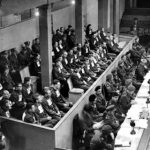
 sentencing. A report was made on November 18, 1945, regarding the completion of the Belsen Trial the day before, and the final outcome of said trial. Then, on December 13, 1945, Joseph Kramer and Irma Grese, the monarchs of Belsen were two of the people hanged for Nazi concentration camp crimes, according to the sentences imposed on them after the trial. Nine other concentration staff members were also hanged on the same day. Sentencing and the carrying out of said sentence was certainly handled more quickly than they would have been in this day and age.
sentencing. A report was made on November 18, 1945, regarding the completion of the Belsen Trial the day before, and the final outcome of said trial. Then, on December 13, 1945, Joseph Kramer and Irma Grese, the monarchs of Belsen were two of the people hanged for Nazi concentration camp crimes, according to the sentences imposed on them after the trial. Nine other concentration staff members were also hanged on the same day. Sentencing and the carrying out of said sentence was certainly handled more quickly than they would have been in this day and age.
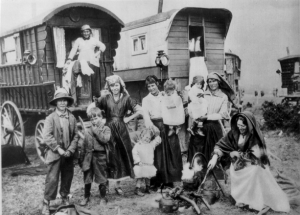 When we think of the horrors of the Holocaust, we think of millions of Jewish people who were murdered because they were Jewish. The horrible things Hitler did are so awful, that most of us can hardly bare to think about it at all. It is uncertain just when the Holocaust began, but the accepted date is January 30, 1933. That date is when Adolf Hitler was appointed German chancellor, setting in motion what would become the Nazi genocide against the Jews. On September 15, 1935, the Nuremberg Laws were enacted. The Nuremberg Laws were anti-Jewish statutes enacted by Germany, that were a major step in clarifying racial policy and removing Jewish influences from Aryan society. These laws, were the foundation on which the rest of Nazi racial policy hung.
When we think of the horrors of the Holocaust, we think of millions of Jewish people who were murdered because they were Jewish. The horrible things Hitler did are so awful, that most of us can hardly bare to think about it at all. It is uncertain just when the Holocaust began, but the accepted date is January 30, 1933. That date is when Adolf Hitler was appointed German chancellor, setting in motion what would become the Nazi genocide against the Jews. On September 15, 1935, the Nuremberg Laws were enacted. The Nuremberg Laws were anti-Jewish statutes enacted by Germany, that were a major step in clarifying racial policy and removing Jewish influences from Aryan society. These laws, were the foundation on which the rest of Nazi racial policy hung.
The Jewish people were not the only group of people who came to the attention of Hitler’s insane mind either. Under the rule of Adolf Hitler, a supplementary decree to the Nuremberg Laws was issued on November 26, 1935, defining Gypsies as “enemies of the race-based state”, the same category as Jews. The Nuremberg racial 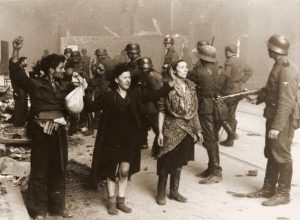 laws of September 15, 1935, “Law for the Protection of German Blood and Honor” and “Reich Citizenship Law” did not explicitly mention Gypsies, but in commentaries interpreting these laws, “Gypsies were included, along with Jews and Negros, as racially distinctive minorities with alien blood. As such, their marriage to Aryans was prohibited.” Like the Jews, the Gypsies were also deprived of their civil rights. Hitler viewed Jews and Gypsies as a defective race, in fact he viewed all non-white people as defective. I suppose this view was what originally justified Hitler’s brutal murder of 6 million Jews and who knows how many people of other races. On this day, November 15, 1943, Heinrich Himmler, who was the Reichsführer of the Schutzstaffel (Protection Squadron, or SS), and a leading member of the Nazi Party (NSDAP) of Nazi Germany ordered that Gypsies and those of mixed Gypsy blood are to be put on “the same level as Jews and placed in concentration camps.”
laws of September 15, 1935, “Law for the Protection of German Blood and Honor” and “Reich Citizenship Law” did not explicitly mention Gypsies, but in commentaries interpreting these laws, “Gypsies were included, along with Jews and Negros, as racially distinctive minorities with alien blood. As such, their marriage to Aryans was prohibited.” Like the Jews, the Gypsies were also deprived of their civil rights. Hitler viewed Jews and Gypsies as a defective race, in fact he viewed all non-white people as defective. I suppose this view was what originally justified Hitler’s brutal murder of 6 million Jews and who knows how many people of other races. On this day, November 15, 1943, Heinrich Himmler, who was the Reichsführer of the Schutzstaffel (Protection Squadron, or SS), and a leading member of the Nazi Party (NSDAP) of Nazi Germany ordered that Gypsies and those of mixed Gypsy blood are to be put on “the same level as Jews and placed in concentration camps.”
Hitler’s decision to include the Gypsies, and the ensuing murders of up to 500,000 Romani Gypsies, became known as the Romani Holocaust, or Porajmos, which means cutting, fragmentation, or destruction; or 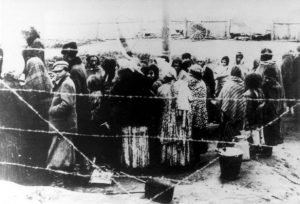 Samudaripen, which means mass killing. It was Nazi Germany and its allies planned and attempted effort to exterminate the Romani Gypsy people of Europe. Some historians put the death toll as high as 1.5 million. In 1982, West Germany formally recognized that genocide had been committed against the Romani. In 2011 the Polish Government passed a resolution for the official recognition of August 2nd as a day of commemoration of the genocide. As I was researching this horrific genocide, I began to wonder how it was that I had never heard about it before. Was I living under a rock? In reality, I doubt if it was in any of the history books of my time, because no one admitted that it happened until 1982, at the earliest.
Samudaripen, which means mass killing. It was Nazi Germany and its allies planned and attempted effort to exterminate the Romani Gypsy people of Europe. Some historians put the death toll as high as 1.5 million. In 1982, West Germany formally recognized that genocide had been committed against the Romani. In 2011 the Polish Government passed a resolution for the official recognition of August 2nd as a day of commemoration of the genocide. As I was researching this horrific genocide, I began to wonder how it was that I had never heard about it before. Was I living under a rock? In reality, I doubt if it was in any of the history books of my time, because no one admitted that it happened until 1982, at the earliest.

